中考英语语法:副词的基本知识
初中英语中考语法:形容词和副词总结归纳
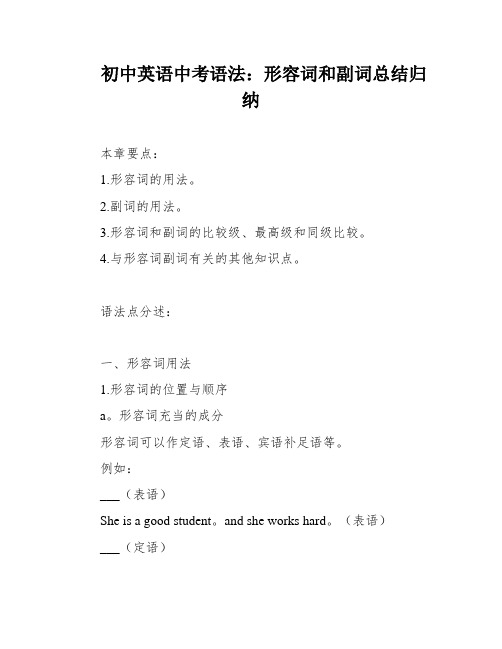
初中英语中考语法:形容词和副词总结归纳本章要点:1.形容词的用法。
2.副词的用法。
3.形容词和副词的比较级、最高级和同级比较。
4.与形容词副词有关的其他知识点。
语法点分述:一、形容词用法1.形容词的位置与顺序a。
形容词充当的成分形容词可以作定语、表语、宾语补足语等。
例如:___(表语)She is a good student。
and she works hard。
(表语)___(定语)b。
形容词的顺序形容词的顺序为:限定词、外观(大小、长短和高低)、形状、年龄(新旧)、材料、颜色、国籍。
主观在前,客观在后。
例如:一件昂贵的俄国产的棕色皮大衣一条可爱的丹麦的小美人鱼One day they crossed the old Chinese ___.一根爷爷传给我的长长的棕色的波斯木纹手杖a。
特殊形容词的位置特殊形容词修饰不定代词时放在后面。
例如:I had ___ that there would be nothing us because it was fairly common for an old man to catch illness。
(fairly为特殊形容词)well、ill等表达健康状况、情感类形容词只作表语,不做定语。
例如:He is an ill man.(定语)He is ___.(表语)二、副词用法副词可以修饰动词、形容词、副词和整个句子。
例如:___(修饰动词)___(修饰形容词)___(修饰副词)Fortunately。
___(修饰整个句子)三、形容词和副词的比较级、最高级和同级比较形容词和副词的比较级通常在词尾加-er,最高级通常在词尾加-est。
例如:fast。
faster。
fastestbeautiful。
more beautiful。
most beautiful同级比较则使用as…as结构。
例如:She is as smart as her sister.四、与形容词副词有关的其他知识点其他知识点包括:形容词的转化、副词的修饰范围等。
初中英语语法知识精讲:常用副词考法归纳2

初中英语语法知识精讲:常用副词考法归纳2alone 用法小归纳1.表示“独自”“单独”,可用作形容词或副词;但用作形容词时,只用作表语,不用于名词前作定语。
如:I’m terrified at the prospect of being alone in the house. 我要是自己呆在一所房子里就很害怕。
I realized they wanted to be alone together so I felt very awkward. 我意识到了他们想要单独在一起,所以觉得很尴尬。
be alone in (doing) sth为惯用搭配,其意为“唯一的……”。
如:He is not alone in believing that it may lead to war. 不单他一个人认为那会引起战争。
2.通常不用very 修饰,但可用very much, all 修饰。
如:He went there all alone. 他独自一个去了那儿。
3.用于名词或代词后,表示“仅仅”“只有”。
比较:She decided not to go there alone. 她决定不单独去那儿。
She alone decided not to go there. 只有她决定不去那儿。
4.let alone为习语,意为“更别提”“更不用说”。
如:He hasn’t enough money for food, letalone amusements. 他连吃饭钱都不够,就更不用说有钱玩了。
Her income was barely enough to maintain one child, let alone three. 她的收入养活1个孩子都几乎不够,更不用说3个了。
其后若接动词,通常与前面相关动词形式相同。
如:The baby can’t even sit up yet, let alone walk! 这个婴儿连坐都坐不稳,更不用说走路了。
第六章副词(思维导图+知识梳理+好题精炼)2022-2023初中英语中考语法归纳
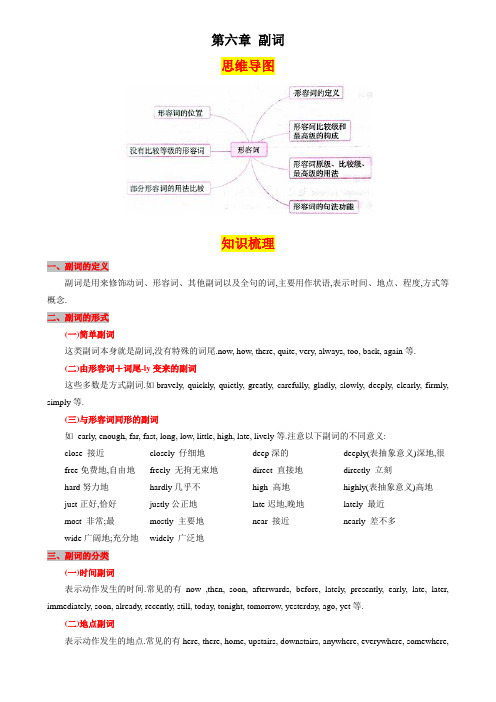
第六章副词思维导图知识梳理一、副词的定义副词是用来修饰动词、形容词、其他副词以及全句的词,主要用作状语,表示时间、地点、程度,方式等概念.二、副词的形式(一)简单副词这类副词本身就是副词,没有特殊的词尾.now, how, there, quite, very, always, too, back, again等.(二)由形容词+词尾-ly变来的副词这些多数是方式副词.如bravely, quickly, quietly, greatly, carefully, gladly, slowly, deeply, clearly, firmly, simply等.(三)与形容词同形的副词如early, enough, far, fast, long, low, little, high, late, lively等.注意以下副词的不同意义:close 接近closely 仔细地deep深的deeply(表抽象意义)深地,很free免费地,自由地freely 无拘无束地direct 直接地directly 立刻hard努力地hardly几乎不high 高地highly(表抽象意义)高地just正好,恰好justly公正地late迟地,晚地lately 最近most 非常;最mostly 主要地near 接近nearly 差不多wide广阔地;充分地widely 广泛地三、副词的分类(一)时间副词表示动作发生的时间.常见的有now ,then, soon, afterwards, before, lately, presently, early, late, later, immediately, soon, already, recently, still, today, tonight, tomorrow, yesterday, ago, yet等.(二)地点副词表示动作发生的地点.常见的有here, there, home, upstairs, downstairs, anywhere, everywhere, somewhere,nowhere, abroad, away, back, below, down, up, on, under, over, out, outside, backwards等.(三)方式副词表示动作发生的方式,这类副词数量最多,大多数以形容词加-ly构成.常见的有anxiously, awkwardly, angrily, absurdly, badly, bravely, calmly, carefully, carelessly, patiently, politely, proudly, properly, quickly, rapidly, suddenly, successfully, willingly, warmly等.(四)程度副词有时又叫强调副词,有的从程度上强调,用来回答how much这类问题,可用来修饰形容词、副词,有的还可用来修饰动词、介词短语、名词、代词和从句等.常见的有a bit, very, quite, rather, much, too, pretty, so, awfully, almost, entirely, nearly, never, partially, wholly, especially, even, exactly, just, only, simply等.这类副词一般位于它所修饰的词的前面.(五)频度副词描绘一定时间内动作发生的频率的副词.常见的有always, ever, frequently, never, often, rarely, seldom, sometimes, usually, unusually等.(六)疑问副词(一般用于特殊问句句首)主要用来构成特殊疑问句.常见的有how, when, where, why, what等.(七)句子副词这类副词往往和整个句子具有松散的语法关系,而并非修饰某个动词,actually, by all(no)means, decidedly, evidently, generally, frankly, indeed, in my opinion, unexpectedly, no , now, obviously, yes ,undoubtedly, luckily, seriously等.(八)连接副词用来连接句子、分句或从句,表示各种关系.1.表示结果therefore因此, accordingly从而2.表示添补besides此外, moreover再者3.表示对比however不管怎样, nevertheless然而4.表示条件otherwise否则5.表示时间then然后, lastly最后(九)解释副词常用来举例或列举,e.g.(=for example) 例如,for example 例如,i.e.(=that is)那就是.(十)关系副词常用来引导定语从句的有when, where, why等.各类副词举例如下:The bus arrived early.这趟车到得早.If you don't try, you will never succeed.你如果不尝试,就决不会成功.When and Where did you see him?你何时何地见到他的?I often write to her mother.我经常给她妈妈写信.How well he looks!他看起来多么健康啊!四、副词的句法功能副词在句中主要用作状语,修饰动词、形容词、副词或全句等;有时也用作表语、定语.(一)作状语This is a fairly useful tool.这是一件相当有用的工具.She usually wears belt-bag that round her middle when she goes out.她外出时,经常在腰间系上腰包.(二)作表语The train is off.火车开了.I must be off.我该走了.School is over.放学了.(三)作定语Life here is full of joy.这儿的生活充满了欢乐.Everyone there can speak English.那里的每个人都可以讲英语.(四)用作宾语补足语或主语补足语I saw him out with a girl.我看见他和一个女孩出去了.He was called in.他被叫了进来.五、副词的位置(一)频度副词频度副词的位置一般是置于be动词或助动词之后,若是其他动词则可置于之前.They sometimes stay up all night.他们有时整夜不睡觉.He can never understand.他永远也不会懂.有些频度副词,如:sometimes, yet, soon, once, often等也可放在动词后面(句尾);有些频度副词如:sometimes, usually, always, often, soon等需要强调时,也可放在句首.They'll be back soon.他们很快就回来.Usually I'm very careful.通常我是非常小心的.(二)程度副词一般放在所修饰的形容词、副词的前面,修饰动词时则取决于句中的位置.She is a very good student.她是个非常好的学生.The story is quite instructive.这故事很有教育意义.特别强调时,也可将程度副词放在句尾.例如:I've forgotten it completely.我把这事全给忘了.enough用作副词,一般放在所修饰的词后面.He didn't run quickly enough.他跑得不够快.The house isn't big enough for us.这房子对我们来说不够大.通常放在句尾,也可放在句首,一般不用于句中.We heard her singing an English song outside.我们听见她正在外面唱一首英文歌.Here you can find whatever kinds of books you want.在这里你可以找到各种你想要的书.(四)时间副词表示确定时间的时间副词一般放在句尾,有时放在句首.Tomorrow they are leaving for Beijing.明天他们要去北京.Yesterday she was late for class.昨天她上学迟到了.(五)方式副词方式副词在句中的位置比较灵活.She drives too fast.她开车开得太快.He hurriedly finished his supper and went out.他匆忙地吃完晚饭就出去了.点拨及物动词和副词如:down, off, in, out, up等组成的动词词组,其宾语如果是名词,该名词一般放在副词之后,但也可放在副词之前:若是代词,该代词要放在副词之前.Take off your coat.(或:Take your coat off./Take them of)脱掉你的外套.Turn off the radio.(或:Turn the radio off./Turn it off.)关上收音机.(六)疑问副词、连接副词通常放在句子(或从句)的开头.Where are they going?他们去哪儿?What are you going to do when you grow up?长大后,你打算干什么?How shall we do it?我们该怎么做呢?(七)副词的排列顺序若句子存在几个副词时,一般按方式副词-地点副词-时间副词的顺序排列.六、副词比较级和最高级的构成及其用法同形容词一样,副词也有三个比较等级:原级、比较级和最高级.(一)副词比较级、最高级的构成1.规则变化构成方法原级比较级最高级单音节词和少数双音节词一般在词尾加-er或-estfasthardnearfasterhardernearerfastesthardestnearest 以字母e结尾的副词加-r或-st late later latest 以辅音字母y结尾的副词,先变i,再加-er或-estearly earlier earliest多音节词和部分双音节词在副词前加more或mostquickly more quickly most quicklycarefully more carefully most carefully原级比较级最高级Well better bestBadly worse worstLittle less leastMuch more mostLate later较迟,后来(指时间) latest最近(指时间) latter后来(针对前者而言) last最后(指顺序) Far farther较远farthest最远further进一步furthest最远,最大程度上1.原级常用于as+副词原级+as和not so/as+副词原级+as结构as...as常用于肯定句,表示“······和······一样”;not so/as...as用于否定句,表示“不如”.We must arrange everything as well as we can.我们要把一切尽可能安排好.You didn't know so(as) much about that as I do.关于那件事,你了解得没有我这么多.2.比较级常用于“比较级+than”结构,有时than引导的比较状语从句可以省略,当than前后所使用的动词相同时,通常用助动词来代替原有的动词,而且该助动词也可以省略比较级前可用much, far, a bit, a little, a great(deal),a lot, completely, even, still, yet等表示程度的状语.She answered the question more clearly than her classmates did.她回答问题比她的同学回答得清楚.It rains more often in the south than in the north.南方比北方雨多.Li Ping jumped farther than Jim (did).李平跳得比吉姆远.3.副词的最高级表示三者或三者以上(人或物)的比较,其中有一个在某方面超过其他几个时,要用最高级副词的最高级前面可以加定冠词the,也可以不加.句中一般可带in和of引导短语来说明比较的范围.如: The longest I can stay is three hours.我最多只能呆三小时.Tom came to school(the)latest in his class.汤姆是班上到校最晚的.4.可用“the+比较级·····,the+比较级······”结构,表示“越······就越······”的意思The higher you climb, the farther you will see.你爬得越高,就看得越远.The harder she studied, the more progress she made.她学习越努力,进步越大.5.可用“比较级+and+比较级”结构(两个同义副词比较级,后面不接than从句)表示“越来越·····”的意思Jim runs faster and faster.吉姆跑得越来越快.The students study harder and harder.学生们学习越来越努力.七、常用副词的用法比较(一)already, yet, stillalready用于肯定句,表示“已经”.yet用于否定句作“还”解,用于疑问句作“已经”解.still主要用于肯定句,放在be动词或情态动词后实义动词前,表示动作或状态的持续,作“仍然”解.He had already left when I called.我打电话时,他已经走了.It's already ten o'clock. Who is still washing there?已经10点钟了,谁还在那儿洗衣服?Have you found your ruler yet?你找到你的尺子了吗?点拨(1)already在疑问句中有表示惊奇等感情的功能,但它通常被用来表示因事情进展迅速而吃惊,而still则表示因事情进展缓慢而吃惊.如:Have you done it already?你已经做完了?Are you still reading the book?你还在读那本书吗?(2)yet和still可用于比较级前,表示程度Tom sings well but Jim sings still better.汤姆唱得好,但吉姆唱得更好.The manager has yet more important things to do.经理还有更重要的事要做.(二)so, neither, nor三个词都能表示后者和前者情况相似.so用于肯定句,用句型:so+助动词(系动词或情态动词)+主语.neither和nor用于否定句,用句型:neither(nor)+助动词(系动词或情态动词)+主语.She likes dancing. So does he.她喜欢跳舞,他也一样.Jack didn't like the play. Nor did we.杰克不喜欢这出戏,我们也不喜欢.(三)too, also, either这三个词作副词用时都含有“也”的意思,但用法是不同的.1.too和also不能用于否定句,只能用于肯定句中.too用于句末,also用于句子中间I enjoy swimming and like football, too.我喜欢游泳,也喜欢踢足球.I'm tired, and hungry, too.我累了,(肚子)也饿了.2.either只能用于否定句中,放在句末.too或either前面可以用逗号,也可以不用Kate didn't go to the cinema and Lucy didn't go, either.凯特没去看电影,露西也没去看电影.It's not easy, but it's not difficult, either.它不容易,但也不难.(四)enough...to, too...to1.enough to do sth.足以能够做某事The window is low enough for him to touch.窗很低,他碰得到.You are old enough to do the work alone.你已经大了,可以独立做这项工作了.He is tall enough to reach the apple.他的个子高,能够着那个苹果.2.too...to(do)太······以致不能The milk is too hot to drink.牛奶太烫了,不能喝.She's too young to get married.她太小不能结婚.They spoke English too quickly for us to understand.他们讲英语太快,我们听不明白.(五)now, just, just now1.now与一般现在时、现在进行时、现在完成时连用时,意为“现在”Where does he live now?他现在住在哪里?They are now doing some washing.她们正在洗衣服.2.just常与现在完成时、过去完成时连用,表示“刚······”We have just seen the film.我们刚看过那部电影.He said he had just bought a dictionary.他说他刚买了一本字典.3.just now和过去时连用,表示“刚才”(=a moment ago)He was here just now.他刚才在这.4.和一般现在时或现在进行时连用时,just now与“just at the moment”同义,有加强now(此时)的语气的作用We are very busy just now.我们此时很忙.She is doing her homework just now.她此时正在做作业.(六)ago, beforeago表示以现在为起点的“以前”,它必须和一些表示时间概念的词组搭配使用,常在一般过去时态的句子中修饰动词.before是指以过去或将来的某时刻“以前”,也可泛指以前,常和现在完成时、过去完成时和一般过去时连用.I saw him ten minutes ago.10分钟前我见过他.He told me that he had seen the film (two days)before.他告诉我他(两天)以前看过这部电影.I never saw him before(=I have never seen him before.)我以前从来没见过他.(七)although, though一般情况下,although和though可互换使用,但在语言具体使用过程中,要特别注意以下几点:1.although有增强语气的作用,比though的语气稍重,常用于各种正式文体;而非正式的口语或书面语中,though用得较为普遍2.though常与even连用,表示强调.但不能说even although(八)nearly, almost都可译为“差不多,几乎”,常可通用.其区别:1.nearly可以用在not后,意思是“远远不(够)”,而almost不能I'm not nearly ready.我完全没有准备好.I have £ 20,but that isn't nearly enough for the travel.我有20英镑,但那远远不够旅行的费用.2.almost可以用在any, no, nobody, nothing, none, never前,而nearly不能Almost no one believes her.几乎没人相信她.I almost never saw him.我几乎没见过他.3.though引导的让步状语从句可用部分倒装的形式(注意:倒装后位于句首的名词之前不用冠词),但although一般不这样用.Young though she is, she has travelled to many countries.她尽管年轻,但已到过很多国家.Hard though they tried, they couldn't make her change her mind.尽管他们做了很大努力,却没法让她改变主意.(九)sometimes, sometime, some time1.sometimes的意思是“有时,往往,不时地”Sometimes we are busy and sometimes we are not.有时我们忙,有时我们不忙.I sometimes have letters from him.我不时地收到他的信.2.sometime的意思是“某个时候”,可指将来,也可指过去We'll take our holiday sometime in May.我们将在五月份的某个时候休假.Let's have dinner together sometime next week.下星期找个时间咱们一起吃顿饭.3.some time的意思是“一段时间”,可以是几分钟、几小时、几天甚至几年The fire went on for some time before it was brought under control.火灾持续了一段时间以后才得到了控制.He stayed in Beijing for some time and then began to move on.他在北京住了些日子又继续搬迁.(十)finally, at last, in the end都有“最后”“最终”之意,常可互换,但用法不完全一样.finally通常在讲最后一个内容时用.Finally I'd like to thank all of you for coming to the party.最后我想向所有出席这次聚会的人表示感谢.at last有强烈的感情色彩,表示经过曲折“终于”.He looked for it everywhere. At last he found it.他到处找,最后终于找到了它.在表示将来的“最终”“终于”时,只能用in the end.We believe that he will become a famous writer in the end.我们相信他最终将成为一名名作家.(十一)maybe, perhaps, possibly和probably都可译为“可能”“也许”.其区别:probably的可能性最大,可译为“十有八九”“很可能”.maybe和perhaps的可能性通常是50%.possibly可能性最小,可能性不超过30%.好题精练一、写出下列副词的比较级和最高级形式1.fast________ ________2.early________ ________3.well________ ________4.little________ ________te________ ________6.hard________ ________7.much________ ________ 8.correctly________ ________9.quickly________ ________ 10.carefully________ ________答案:1.faster,fastest2.earlier,earliest3.better,best4.less,leastter,latest6.harder,hardest7.more,most 8.more correctly, most correctly9.more quickly, most quickly 10.more carefully, most carefully二、根据句意,给下列句子填上适当的词1.He doesn't run________ fast as I do.2.My sister doesn't speak English as fluently(流利) ________ my brother.3.The baby cried harder and________.4.Does it rain________ often in summer in Shanghai than in Beijing?5.I'm________ hungrier now.答案:1.so/as2.as3.harder4.more5.a little/much三、选择括号中适当的词填空1.This boy is________ clever but________ lazy.(rather, quite)2.I like Tom and Mary. They are________ nice people.(such, so)3.There's________ anything in the bridge.(hardly, hard)4.The piano is________ heavy to move.(too, enough)5.Don't go now. It is________ raining hard.(yet, still)6.He is ________ ready to help people. We like him.(always, never)7.George is always________ .Now he is driving along the narrow road.(carefully, careful)8.Our holiday was too short. The time passed very________ (quickly, quick)答案:1.quite,rather2.such3.hardly4.too5.still6.always7.careful,carefully8.quickly四、选择填空1.Wu Dong learns English________.A. goodB. niceC. wellD. fine2.-How________ is it from your school to the post office?-Only a few kilometres.A. longB. oftenC. soonD. far3.My brother is good at drawing, I am good at it, ________.A. tooB. eitherC. neitherD. also4.- ________ did you go last weekend?-I went to the Great Wall.A. WhatB. WhereC. WhenD. Who5.Who runs________ in your class?A. fastB. fasterC. fastestD. more fast6.Which do you like________, bread, rice or noodles?A. betterB. bestC. wellD. much7.Have you ever seen________ big panda before?A. a suchB. such a C .so a D. a so8.He eats________ food, so he is________ fat.A. much too; too muchB. much too; too manyC. too much; much tooD. too much; many too9.Have you received a letter from Jim________?A. yetB. justC. neverD. ever10.I don't feel very________ today.A. goodB. wellC. betterD. nice答案:1-5CDABC 6-10BBCAB五、用括号内词的适当形式填空1.Tom studies________ (hard) than you.2.He sang________ (badly) than any other boy in the group. His elder sister sang________ (well) of all.3.She speaks English quite________ (well),but she doesn't speak as________ (well) as Mary.4.I cannot run as________ (fast) as you. You run________ (fast) than me.5.He writes________ (carefully) than she does. He doesn't write as________ (carefully) as she does.6.Black swims________ (well) than I do, but he doesn't swim as________ (well)as my brother.7.They all finished the work two hours________ (early) than usual.8.I walk________ (slowly) than my sister.答案:1.harder2.worse,best3.well,well4.fast,faster5.more carefully, carefully6.better,well7.earlier 8.more slowly。
初中英语语法知识点:时间副词
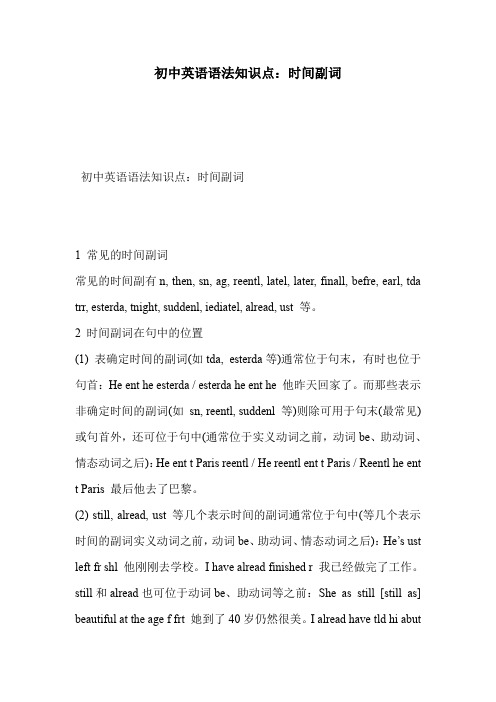
still位于be动词之后或其他动词之前:
She is still in bed
她还在睡觉。
et的含义是“到说话的时候为止”。它主要用于否定句或疑问句。
still强调动作在继续延续,主要用于肯定句或疑问句,但可用于否定句以强调否定意义的动作仍在延续:
He still desn’t understand
他仍然不懂。(“不懂”这一否定意义的动作在延续。)
He desn’t understand et
他还没有弄懂。(“懂得”这一肯定意义的动作还没开始。)
still和et重读时表示惊讶、讨厌或不耐烦。它们都可以当做连词使用。
E、ust作为时间副词跟复合时态连用:
I’ust ing
我正要。
时间副词用法特点:
e’ll sn be there
我们马上会到那里。
B、befre,earl,iediatel和late位于句末:
He ae late
他晚了。
I’ll g iediatel
我马上就走。
但befre和iediatel用做连词引导一个从句时,应位于从句的句首:
Iediatel the rain stps e’ll set ut
雨一停我们就走。
、sine和ever sine与完成时连用:
sine位于助动词之后或否定句及疑问句的句末,ever sine(副词)位于句末。
带有sine和ever sine的短语和从句常位于句末,有时放在句首也是可以的:
He’s been in bed sine his aident/sine he bre his leg
(误)He ill be ba the next nda
中考英语常用语法知识——副词经典题(含答案解析)

一、选择题1.We hope that more trees________in our city next year.A.plant B.were plantedC.planted D.will be planted D解析:D【解析】【详解】句意:我们希望明年我们的城市能种更多的树。
考查动词的时态和语态。
主语more trees和动词plant是被动关系。
根据时间状语“next year”可知我们希望明年我们的城市能种更多的树,讲述的将来的动作,是要用一般将来时的被动语态,其构成为will be done。
故选D。
【点睛】句子的谓语动词不仅要考虑时态,也要考虑语态。
根据时间状语可以判断出时间是现在、过去或是将来;根据主语与谓语动词的关系可以判断出是主动还是被动。
此句“next year”是一般将来时的标志,树与种植是被动关系,综合起来是一般将来时的被动语态,所以答案为will be done。
2.Nick a job in a bank, but to our surprise, he didn't take it.A.is offered B.offered C.was offered D.has offered C解析:C【解析】【详解】句意:银行提供给尼克一份工作,但是出人意料的是,他没有接受。
考查被动语态和时态。
offer“提供”。
A.is offered现在时的被动语态;B.offered过去式;C. was offered过去式的被动语态;D.has offered现在完成时。
offer与主语Nick之间是被动关系,故用被动语态,根据下半句didn’t可知是过去式。
故选C。
3.Last year, the first made-in-China ballpoint pen tips(圆珠笔笔头)were _________ by Taiyuan Iron(铁)&Steel.A.divided B.required C.produced C解析:C【解析】【详解】句意:去年,第一批国产圆珠笔笔尖由太钢生产出来。
初中英语中考语法:形容词和副词总结归纳
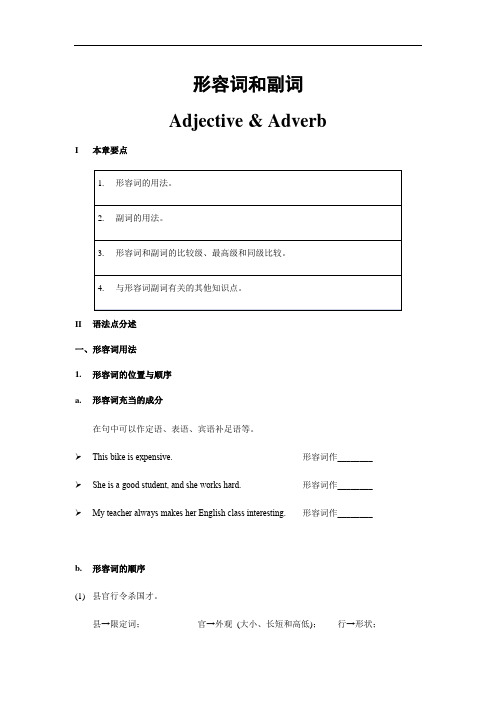
形容词和副词Adjective & AdverbI本章要点II语法点分述一、形容词用法1. 形容词的位置与顺序a. 形容词充当的成分在句中可以作定语、表语、宾语补足语等。
➢This bike is expensive.形容词作________➢She is a good student, and she works hard.形容词作________➢My teacher always makes her English class interesting.形容词作________b. 形容词的顺序(1) 县官行令杀国才。
县→限定词;官→外观(大小、长短和高低);行→形状;令→年龄(新旧);杀→颜色;国→国籍;才→材料。
(2)美小圆旧黄,法国木书房(主观在前,客观在后)★小试身手★1)一件昂贵的俄国产的棕色皮大衣2)一条可爱的丹麦的小美人鱼3)One day they crossed the_______bridge behind the palace.A. old Chinese stoneB. Chinese old stoneC. old stone ChineseD. Chinese stone old4)一根爷爷传给我的长长的棕色的波斯木纹手杖A long brown Persian wooden walking stick from my grandpa(老师可自选补充)a.特殊形容词的位置(1) 形容词修饰不定代词时放在后面。
➢I had initially thought that there would be nothing serious because it was fairly common for an old man to catch illness.本来我以为没什么大问题的,毕竟人老了,有病痛是在所难免的。
(2) well, ill等表达健康状况、情感类形容词只作表语,不做定语。
初中英语语法之形容词与副词的基本用法讲义(含部分答案)

教学内容形容词和副词知识结构形容词一、形容词的定义形容词是描述人或事物的特征、性质、属性及状态的一种词类,主要用来修饰名词或代词。
二、形容词的句法功能成分说明例句作定语一般放在所修饰词的前面It’s a cold and windy day today. 今天是个寒冷、有风的天气。
1)表示发生时间的副词:►It’s beginning to rain now! 现在开始下雨了!2)表示频繁程度的副词,也称频度副词always, often, usually, sometimes, never, ever, hardly等一般位于系动词、情态动词和助动词之后,实义动词之前。
►She often changes her mind. 她常改变主意。
3)还有一些其他表示时间的副词:►He has just had an operation. 他刚动过手术。
2. 地点副词:here, there, out, somewhere, abroad, home1)有不少表示地点的副词:►She is studying abroad. 她在国外留学。
2)还有一些部分与介词同形的副词。
它们与介词同形,后跟宾语的是介词,否则是副词:①用作介词:Stand up!起立!①用作副词:A cat climbed up the tree. 猫爬上了树。
3)以where构成的副词也是地点副词:It’s the same everywhere. 到处都一样。
3. 方式副词:well, fast, slowly, carefully, quickly1)英语中有大量方式副词,说明行为方式(回答how的问题):►How beautifully your wife dances. 你夫人舞跳得真美。
2)还有相当多的副词,表示某些情绪:►She smiled gratefully. 她感激的笑了笑。
3)还有一些以-ly结尾的副词,表示动作发生的状况:►He left the town secretly. 他悄然离开了这座城市。
初中英语中考语法形容词和副词总结归纳
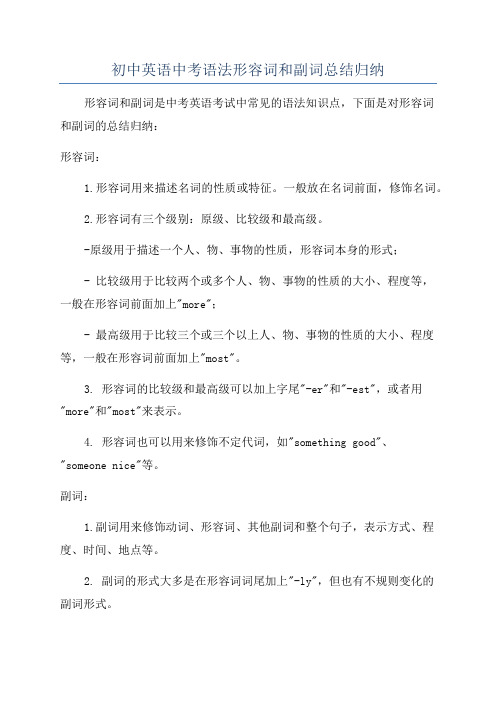
初中英语中考语法形容词和副词总结归纳形容词和副词是中考英语考试中常见的语法知识点,下面是对形容词和副词的总结归纳:形容词:1.形容词用来描述名词的性质或特征。
一般放在名词前面,修饰名词。
2.形容词有三个级别:原级、比较级和最高级。
-原级用于描述一个人、物、事物的性质,形容词本身的形式;- 比较级用于比较两个或多个人、物、事物的性质的大小、程度等,一般在形容词前面加上"more";- 最高级用于比较三个或三个以上人、物、事物的性质的大小、程度等,一般在形容词前面加上"most"。
3. 形容词的比较级和最高级可以加上字尾"-er"和"-est",或者用"more"和"most"来表示。
4. 形容词也可以用来修饰不定代词,如"something good"、"someone nice"等。
副词:1.副词用来修饰动词、形容词、其他副词和整个句子,表示方式、程度、时间、地点等。
2. 副词的形式大多是在形容词词尾加上"-ly",但也有不规则变化的副词形式。
3. 副词有原级和比较级,形式和形容词的比较级一样,可以在副词前面加上"more"来表示。
注意事项:1.形容词和副词的比较级和最高级要根据词的性质和词尾变化,不是所有形容词和副词都可以直接加上字尾来表示比较级和最高级。
2.形容词和副词的用法、位置和修饰的词性有一定的规律,需要具体问题具体分析。
以上是对初中英语中考语法中形容词和副词的总结归纳,希望能够帮助到你。
- 1、下载文档前请自行甄别文档内容的完整性,平台不提供额外的编辑、内容补充、找答案等附加服务。
- 2、"仅部分预览"的文档,不可在线预览部分如存在完整性等问题,可反馈申请退款(可完整预览的文档不适用该条件!)。
- 3、如文档侵犯您的权益,请联系客服反馈,我们会尽快为您处理(人工客服工作时间:9:00-18:30)。
2021年中考英语语法:副词的基本知识英语副词语法基本知识•副词在句中的作用•副词后缀•形容词变副词的规则_加ly词尾规则•不以ly结尾的副词•与形容词同形的副词•副词的比较级和最高级•疑问副词,连接副词和关系副词•副词小品词及其用法•如何区分副词小品词和介词副词在句中的作用1. 作状语1) 作状语修饰动词* Have you seen him lately? 你最近见到过他吗?* The little girl was badly treated by her step-mother. 这个小女孩受到她继母的虐待。
* He angrily tore up the letter. 他很生气,把信撕碎了。
* If you don't mind, David wants to see you personally in his office. 如果你不介意,大卫想在他的办公室与你单独见面。
* Strictly scolded by the teacher, the girl sat there without lifting her head. 女孩被老师严厉地批评着,坐在那里头也没抬。
2) 修饰形容词* Tom is fairly clever,but Peter is rather stupid.汤姆相当聪明,而彼得就颇笨* The boxes are not big enough.这个盒子不够大。
* Some animals are really pretty and lovely. 一些动物真是很漂亮很可爱的。
3) 修饰副词* You're driving too fast. 你开车开得太快了。
* I can't hear very clearly. 我听得不是很清楚。
* They worked very hard this morning. 他们今天早上工作很努力。
4) 修饰整个句子* Usually I go to bed at ten. 通常我十点上床睡觉。
* Frankly, I am not satisfied with your work.说实在的,我对你的工作不满意。
2. 作表语* The fire has been out for half an hour. 火已熄灭半个小时了。
* The gas is off. 煤气关上了。
* Time is up. Let's hurry. 时间到了。
咱们快点吧!* Is your mother in? 你母亲在家吗?* Class is over. 下课了。
* Is the radio on or off? 收音机是开着的还是关着的?* What's up? 发生了什么事?* One of the tyres is down. 一只轮胎没气了。
* Have you been abroad before? 你以前出过国吗?3. 作定语副词可位于名词后作定语。
* The man upstairs felt very angry with the man downstairs.楼上的人对楼下的人非常生气。
* Life here is full of joy. 这儿的生活充满了欢乐。
* The shops around are very cheap. 附近商店的东西很便宜。
4. 作宾语补足语* We must try to help him through. 我们必须设法帮他渡过难关。
* Her mother kept her away from school. 她妈妈不让她上学了。
* Do you want to ask her in? 你想让她进来吗?* They saw me off last week. 上周他们为我送行。
5. 用于构成成语动词* She doesn't give up easily. 她做任何事都不轻易放弃。
* He always gets up early in the morning. 他早上总是很早起床。
* What time am I supposed to check in? 我该什么时候去办理登记手续?副词后缀记住一些后缀的规律可以更高效地记住单词的拼写。
副词的后缀并不多,下面是一些常见的副词后缀。
1) -ly后缀相当大一部分副词是在形容词的基础上加ly后缀而来。
也有小部分副词是在名词或序数词的基础上加ly词尾构成。
a) 形容词加ly词尾,如:happily 高兴地;relatively 相对的;carefully 仔细地b) 名词、序数词加ly词尾,如:partly 部分地;purposely故意地;weekly每周;daily每日地;firstly 第一;fourthly 第四2) -wise 后缀:表方向、方式clockwise 顺时针地,右转地;counterclockwise反时针,左转地;crosswise 横过地,对角横穿地;likewise同样地;otherwise否则,要不然3) -ward(s) 后缀:表示方向afterward(s) 其后,后来;forward(s) 向前,向着将来;backwards(s) 向后;inward(s) 向内,在内;upward (s) 向上;onward(s) 向前,前往;outward(s) 向外,在外;homeward(s) 回家;eastward(s) 向东;northward(s) 向北;westward (s) 向西;southward(s) 向南4) -erly 后缀:表示向、来自easterly 向东方,来自东方;northerly向北方,来自北方;southerly 向南方,来自南方; westerly向西方,来自西方5) -s 后缀:表地点、时间downstairs楼下地;upstairs 在楼上,往楼上;indoors在室内;outdoors在户外;nowadays现今,当今6) -ce 后缀:表示次数once 一次;twice两次形容词变副词的规则_加ly词尾规则英语中有很多形容词可以通过添加ly词尾的方式转变成副词。
了解这个变化规则有助于我们记忆单词并正确地拼写出来。
1) 一般情况下直接在形容词后边加ly。
quick - quicklywide – widelyreal – really2) 多音节词以辅音字母加y结尾的形容词,在加ly之前要先将y变为i,如:happy – happilybusy – busilyeasy – easilyangry - angrily但注意单音节词如shy(羞怯的),sly(狡猾的)等,则直接加ly,如shyly, slyly。
3) 以le 结尾的词,去掉e, 然后直接加y即可,如:gentle – gently (温和地;轻轻地;文雅地)terrible –terribly (可怕地;非常,极度)possible – possibly(可能, 也许)4) 单词true 的副词为truly (即去掉e再加ly)5) 但大部分以e结尾的形容词仍然保留e, 直接加ly,如:active – actively(积极地)polite – politely(礼貌地)6) 单词full 以ll结尾,只需加y形成副词,即fully。
注意不是所有的形容词都可以加ly词尾成为副词。
另外,有一些表示名词或序数词也可以加ly词尾构成副词,如:part – partly (部分-部分地)purpose – purposely (目的-固意地)day – daily (天-每天)hour – hourly (小时-每小时)month – monthly (月-每月)quarter – quarterly (季节-一季一次地)first – firstlythird - thirdly不以ly结尾的副词英语中大部分副词是在形容词的基础上加上ly词尾而形成,如:clear – clearly (清楚的―― 清楚地)angry – angrily (生气的――生气地)suspicious – suspiciously (引起怀疑的; 可疑的――可疑, 可疑地)curious – curiously (奇心的,感兴趣的―― 好奇地)由于以ly结尾,所以大部分副词在句子中比较好辨认,有助于看清句子结构。
但是,英语中也有少数副词不以ly结尾,阅读时应引起注意。
例如:Please drive slow, because I feel sick. 我有点不舒服,请开慢点。
He studied hard and later got a pretty good job overseas. 他努力学习,后来在海外获得一份不错的工作。
注意一些词有没有以ly结尾都可以作副词,但意思不同,如:He was deeply moved by the dreadful suffering of the wounded. 伤者可怕的遭遇使他深受震撼。
They dived deep into the ocean. 他们深深地潜入海中。
He was so nervous and could hardly say a word. 他太紧张了,几乎说不出话来。
You can never be successful, unless you work hard. 如果不努力工作,你就永远不会成功。
This new approach is highly efficient. 这种新方法效率非常高。
I can’t jump that high. 我没法跳得那么高。
Susan seldom comes late. 苏珊很少迟到。
Fishing has been a profitable industry lately. 捕鱼近来成了很赚钱的行当。
Rivlin said the world economy has not fully recovered from the crisis.里夫林认为,世界经济还没完全从危机中复苏。
They know full well that quality means a lot to their company. 他们很清楚质量对公司很重要。
The motion is quite natural and can be easily learned. 这个操作相当自然,而且很容易学会。
Just take it easy. It's no use getting fussed. 放松点,紧张了也没用。
与形容词同形的副词英语中有不少副词与形容词同形。
